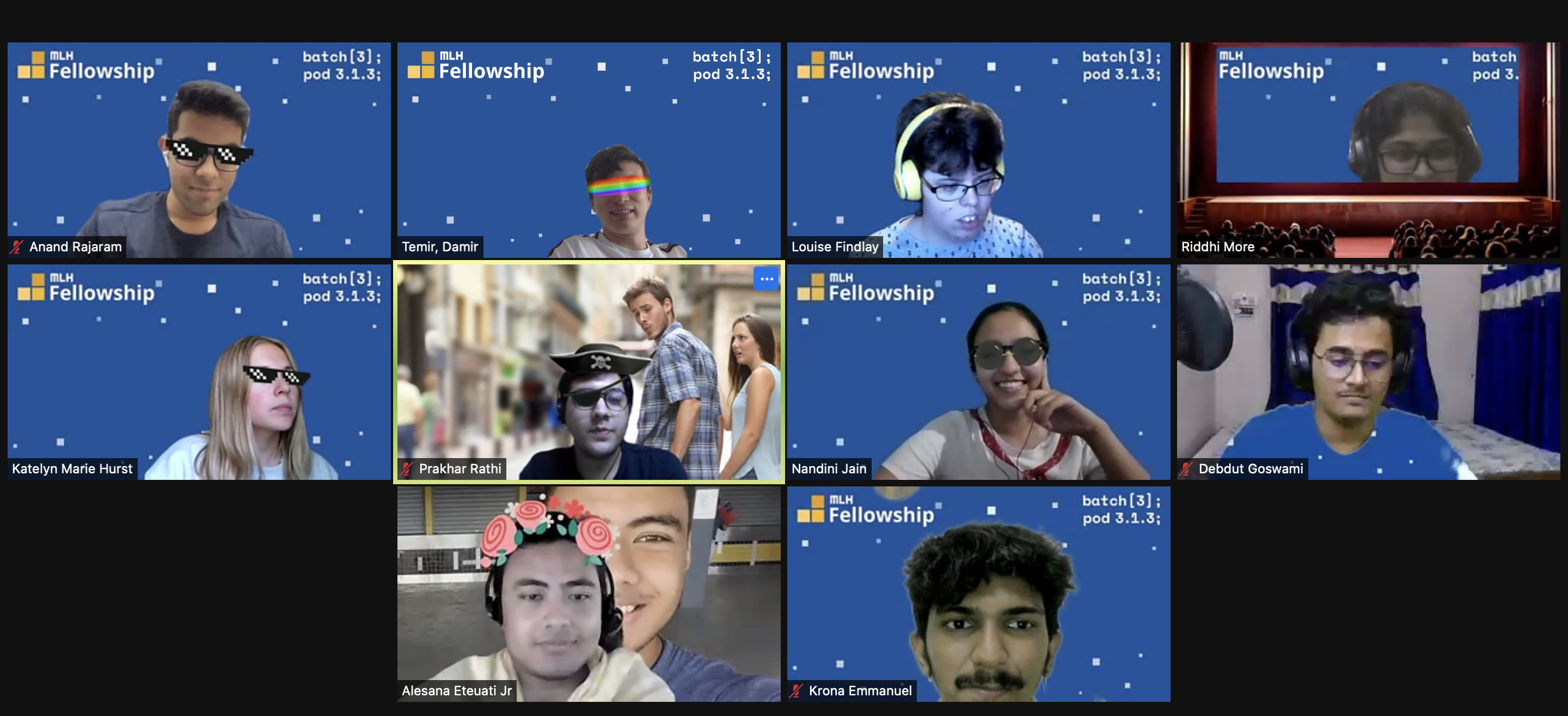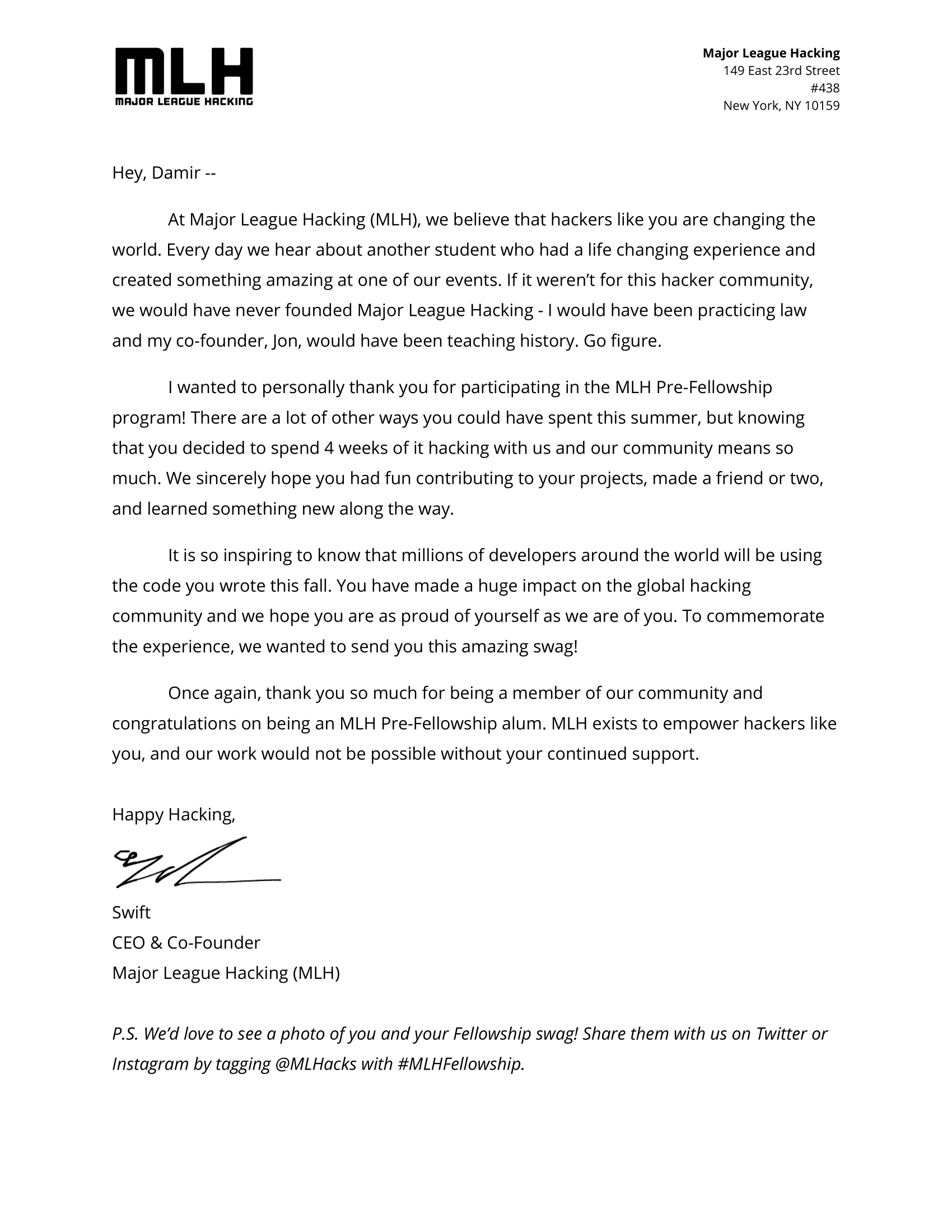mlh pre-fellowship
I was fortunate enough to be in the first ever MLH Pre-Fellowship class this summer 2021, pod-3-1-3.
I met awesome people, explored new technologies, participated in hackathons (won one of them), and met awesome people (yeah, that was the best part)!
 try finding me
try finding me
Let me tell you a little about the experience and why it is a revolutionary program for those who can’t afford traditional industry-like IT experience
Table of contents
- What is MLH?
- What is the MLH Fellowship?
- What is the MLH Pre-Fellowship?
- What are the benefits?
- How does it work?
- How does it help?
What is MLH?
Major League Hacking is an official hackathon1 league that hosts numerous events for people interested in computer science and building things. They help universities around the world to host their own hackathons while also educating community on the importance of collaborative development through hackathons. They are sponsored by large IT companies like Facebook, GitHub2, AWS, and others.
What is the MLH Fellowship?
The MLH Fellowship is a remote internship alternative for aspiring technologists. Spend 12 weeks building your skills by collaborating on real-world projects. (c)MLH
It is a program for students around the world to immerse in an alternative to a traditional 12 weeks internship that so many of us lost when the pandemic started. When the pandemic hit, students like me started speaking up because they lost their summer 2020 internships. So MLH decided to give them an opportunity to still get some working experience.
The three tracks MLH offers today for the Full Fellowship are:
- Open Source
- Help open source projects like scikit-learn to improve
- Software Engineering
- Work with a corporate or government organization on their industry-level software
- Production Engineering (by Facebook)
- Do system engineering to ensure that products are reliable and scalable
What is the MLH Pre-Fellowship?
The MLH Fellowship Prep Program is a 3-week preparation program for aspiring technologists who are interested in experiencing the fellowship before committing to the full 12-weeks. (c)MLH
They have since updated the Pre-Fellowship program to be called Prep and shortened it by a week. But the idea remains the same.
The program is aimed at those who would like to have a taste of MLH before committing to 12 weeks of work. It also helps build a portfolio of projects through short hackathons and teamwork.
 regular pod meeting in zoom
regular pod meeting in zoom
What are the benefits?
It’s important to know what you sign up for before committing weeks of work to it. So I want to give you a quick list of benefits that you get from doing the Pre-Fellowship:
- Networking with other developers who aspire for the same things (jobs, projects, career growth, etc.)
- Sense of the industry (stress from deadlines and close communication with others)
- New projects for the resume
- Advantage when applying for the Fellowship (you have already proved yourself as a prospective candidate)
- You get to skip to the second round of the interview without having to take the behavioral assessment
There is also another major advantage of the MLH Fellowship compared to industry. You are not discriminated based on who you are or where you are in life. Some companies look only for particular candidates when it comes to internships, such as those who reside in North America, have legal status, or in a particular year of college (usually juniors).
I’m happy to share that MLH doesn’t base its decisions on residency, age, or some other nonsense. Instead, they look for your passion for programming and what you can bring to the program (diversity, unique perspectives, experience, etc.). Sounds like that’s how it should work, right?
So these are the most important things to have when applying for the Pre-Fellowship:
- Solid GitHub profile with a history of commits
- Good essay where you share why you want to work with MLH
- Decent communication skills to show that you can freely talk to strangers (a rare skill for CS majors sometimes)
How does it work?
There were around 50 people in the program. We were split in five pods of around 10 members. Each pod had a coach who was the person we worked with daily, and we also had a mentor to whom we could go with problems.
My pod was numbered 3.1.3 and we called it Practically PI.
A general timeline for our work together would be this:
- Week 1.
- Meet other members and have 1:1 meetings with all
- Develop the Jekyll website template together as a pod
- Participate in the Pre-Fellowship Orientation Hackathon (I actually won this one)
- Week 2.
- Split up into smaller teams to work on the second hackathon
- Do spikes to figure out what technologies you might want to use for the group projects
- Week 3.
- Finalize the tech stack used in the group project (for us, it was Discord.js with GitHub API deployed to Linode with a CockroachDB database)
- Make significant progress in the project
- Week 4.
- Do a final sprint to finish the project
- Record a demo, write up a README, create the styling
- Submit it to the Pre-Fellowship Project Hackathon
On top of this, we had daily stand-up meetings where we would update all other pod members of the things we have done. Every Thursday we would also have a retrospective session to debug our teamwork, discussing the ways to make our work environment more effective and comfortable. Every Friday we would have a show-and-tell session to teach each other the things we are passionate about.
For the show-and-tell, I talked about Deep Learning in Protein Design, explaining the AlphaFold 2. Others taught me creating NPM modules, stylizing with Bootstrap, Streamlit, and numerous things.
How does it help?
The Pre-Fellowship was a truly helpful experience for me. I made a lot of friends from around the world while also getting experience working in a team.
At the end of the program, I had a solid project on which I worked with two other developers. I used a new language for me, JavaScript, to build a remarkable project, incorporating things I would have never used, such as Discord.js, Octokit.js, Linode, CockroachDB, GitHub Projects, and Lighthouse3.
Having done this program, I’m just happy to share this letter from MLH’s CEO Swift with you (which was probably sent to all the participants, but I still appreciate it)

-
Hackathon is a type of event where people work together (or individually) to crete software and/or hardware projects in a limited amount of time, usually competing for fun (and prizes) ↩
-
Stay posted for an update for their latest collaboration with GitHub (hint: I’m a part of it) ↩
-
We called it GitCord. It is a Discord Bot that lets you write discussion posts (useful for writing daily stand-up notes for the Pre-Fellowship). You can find the demo on Devpost ↩